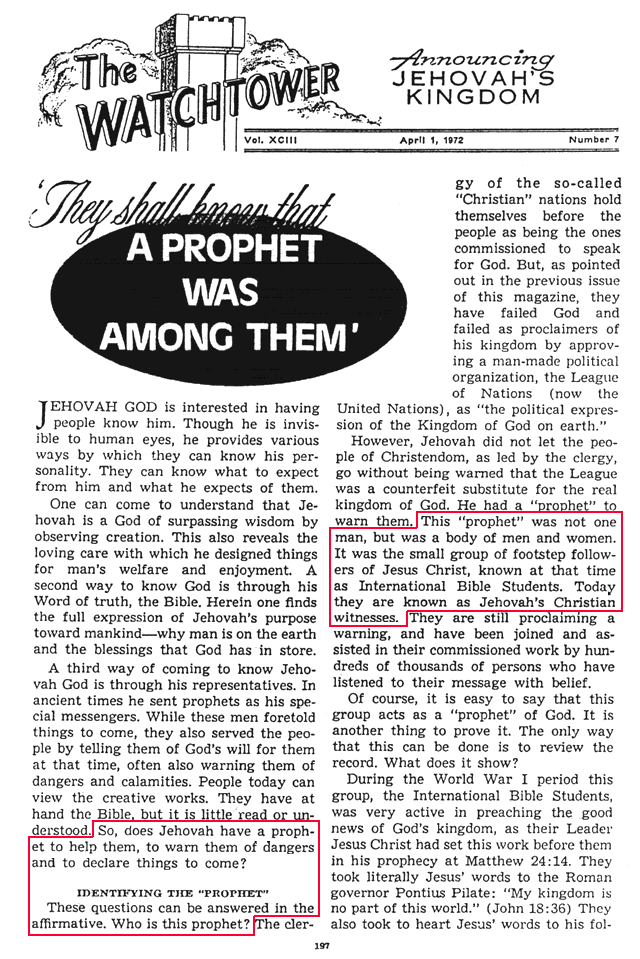You're so right Scully... I guess the point I was trying to make is that the GB 1st claimed to be holy-spirit-inspired and then decided to spin themselves out of this claim (when they found themselves exposed) by changing their status to holy-spirit-directed... All so they can escape being held accoutable... But when the Writing Committee came up with this creative term, they did't even realize that being "directed" by holy spirit (versus being spirit inspired) actually makes the GB even more accountable for their flip-flops, false teachings and failed predictions... Incredibly ridiculous...
The Governing Body has NEVER claimed to be inspired
by Alfred 53 Replies latest watchtower beliefs
-
-
Alfred
Fat Freak... Thanks for adding a piece of that trial transcript... Now I see that bizarre 1955 article had a purpose... Incredible...
-
Mad Sweeney
I'm still not on the computer with the WTLib CD but a google found a scan of the article. It is from April 1, 1972.
-
keyser soze
It wouldn't be so bad if they were to allow such leeway to other religions who make false predictions, or are forced to correct themselves. But instead they submit their errors as proof that god isn't behind them. They're the only ones allowed to use the "imperfect men" excuse.
-
Confession
Here's a little 1980s update on their use of "prophet."
“…the "prophet" whom Jehovah has raised up has been, not an individual man as in the case of Jeremiah, but a class. The members of this class are, like the prophet-priest Jeremiah, wholly dedicated to Jehovah God through Christ and, by the begettal of Jehovah's holy spirit, they have been made part of "a chosen race, a royal priesthood, a holy nation, a people for special possession." [Watchtower 1982 October 1 p.27 Be as Men Who Are Facing Har-Magedon Unafraid]
-
Confession
I've always gotten a kick out of this 1943 quote, which attempts to describe this 'spirit direction.'
“To such remnant of faithful servants of Jehovah God Christ Jesus has entrusted all “his goods”, or earthly interests of the Kingdom. This does not signify that the faithful remnant or society of Jehovah’s anointed witnesses are an earthly tribunal of interpretation, delegated to interpret the Scriptures and its prophecies. No; Christ Jesus the King has not entrusted that office to them. THE SUPREME COURT STILL INTERPRETS, thank God; and Christ Jesus, the Court’s official mouth-piece of interpretation, reserves to himself that office as Head of Jehovah’s “faithful and wise servant” class. He merely uses the “servant” class to publish the interpretation after the Supreme Court by Christ Jesus reveals it. How does the Lord God make known the interpretation? By causing the facts to come to pass visibly which are in fulfillment of the prophecy or dark saying or misunderstood scripture. Thereafter “in due season” he calls such fulfillment or clarification of prophecy and scripture to the attention of his “faithful and wise servant” class. Thereby he makes them responsible to make known the meaning of such scriptures to all members of the household of faith and to all persons of goodwill. This constitutes giving them “meat in due season.”” [Watchtower 1943, p. 203, underlining added]
It’s an interesting line they walk. Don Cameron's "Captives of a Concept" helped me to see it: They claim not to be inspired, but they speak with the same amount of authority as if they are. They demand they be considered as if inspired, not even allowing the flock to question or have doubts about anything they teach without coming under scrutiny. Yet when accused of being false prophets, they then beg off from responsibility, escaping under a manufactured definition of what the word “prophet” means, suggesting that prophet doesn’t necessarily suggest divinely inspired prophet.
Easton’s Bible dictionary provides the same definition for “prophet” found anywhere else. It shows that the Hebrew word translated “prophet” is nabi. It meant “to bubble up as from a fountain,” hence “to utter.”
“The "prophet" proclaimed the message given to him...(See Num. 12:6, 8.) Thus a prophet was a spokesman for God; he spoke in God's name and by his authority (Ex. 7:1).”
How is this different from the position the Society claims to represent?
“Unlike the clergy class, those of the Jeremiah class have been sent by Jehovah to speak in his name.” [Watchtower, Sept. 1, 1979, p. 29, underlining added]
-
leavingwt
Please see Captives of a Concept by Don Cameron, pages 59-61.
-
-
-
leavingwt
You can purchase 'Captives of a Concept' as an instant PDF download here: http://captivesofaconcept.com/NewOrderInformation.html
If you cannot afford the cost of the book, please contact the author and he will GIVE you a copy.



